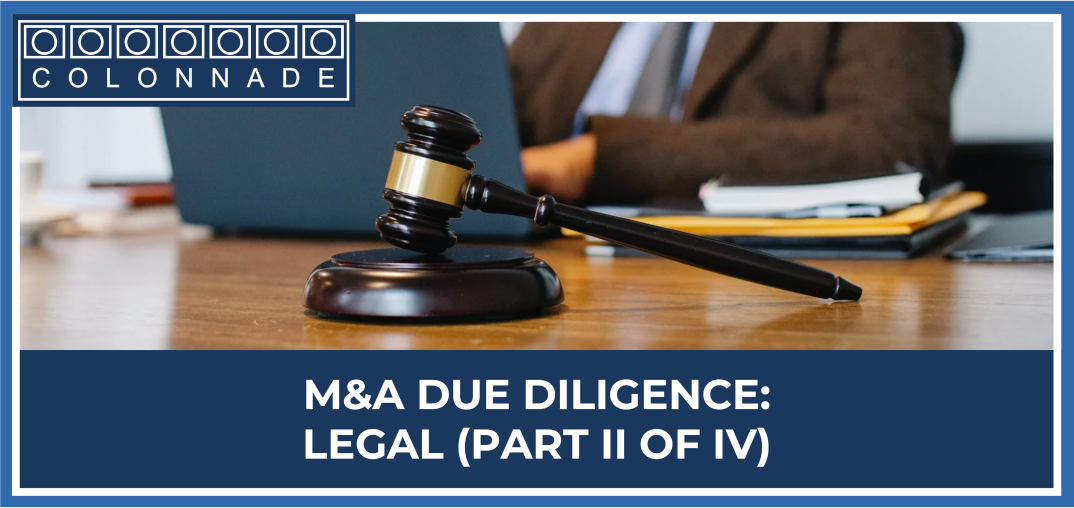M&A Due Diligence: Legal (Part II of IV)

Before purchasing a company, the buyer should understand not only the financial risks associated with the acquisition, but also the legal risks. Some of the most important talking points Colonnade engages in with both parties’ legal teams include gathering all relevant documents, reviewing tax history, reviewing intellectual property, and discussing past or outstanding litigation. Before moving into any sensitive discussion, be sure to establish confidentiality through a non-disclosure agreement.
Relevant Documents
A business may fit on a strategic basis, however upon further review of certain documents, the deal may be derailed. Items such as supplier contracts, leases, employment agreements, benefits, or licensing are topics of conversation that create tension in the success of any deal. Along with understanding the status and nature of customer relationships in business diligence, legal diligence is hyper-focused the outstanding, and sometimes historical, contracts with suppliers and vendors. If a supplier contract is close to expiration during due diligence, the buyer will seek certainty that the contract will be rolled over or replaced upon expiration. Looking into the fine print of each document can be tedious, but it is critical.
An important clause reviewed in all contracts with vendors and landlords is the “change in control” clause. Does the counterparty need to be notified of a change in control? Does the counterparty have the right to terminate the contract or lease upon the change of control? Such clauses are typical in lease agreements.
Taxes
The first matter is to understand the target company’s tax structure. Is it a C Corporation or an LLC? How will the tax structure impact deal proceeds to the sellers? Secondly, three to five years of tax filings will be reviewed to determine if any historical filings create risk for the new owners.
Intellectual Property
All intellectual property is reviewed, including pending and in place patents. A business-critical patent set to expire in the near-term may impact valuation, especially if the patent is a contributing factor to recurring revenue.
Licensing
Business licenses and permits will be reviewed. Additionally, historical applications are frequently reviewed. Attorneys will also review the relevant licensing for the industry to determine if additional licenses and permits should have been in place.
 Compliance
Compliance
Attorneys will review current and historical marketing collateral and customer communications to determine if the materials are in compliance with various state, federal and agency regulations. They will also review any correspondence with, or actions taken by any state or federal agencies. This includes state attorneys general, the FTC, and the FCC.
Litigation
Litigation can be split into three categories: threatened, settled, and pending. Buyers will want to review all historical and current threatened litigation. They will also review settled lawsuits and claims to understand the risk associated with repeat lawsuits and claims and to determine if existing business processes could lead to additional claims. Attorneys will do a deep dive into pending litigation. They will request access to review all correspondence and documents relating to the lawsuit. Current litigation may negatively impact the odds of a transaction closing and will likely impact the deal structure. Buyers will carve-out the litigation and leave the costs and resolution with the seller. However, as historical litigation impacts the company on a go-forward basis reputationally and by setting a standard, buyers will expect to be involved in discussions and decisions around the litigation. To further protect themselves, the buyer will often require that a portion of the purchase price be held in escrow until the litigation is resolved.
For more on Legal Diligence, please listen to Middle Market – Mergers and Acquisitions by Colonnade Advisors, episode 004 https://coladv.com/podcasts/004/


